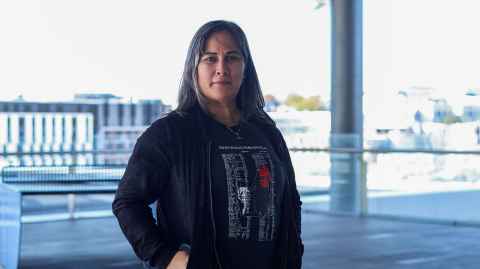Empowering whānau through culturally safe cancer screening
8 May 2025
PhD candidate Nadine Riwai hopes to transform national cancer screening for Māori.

Māori researchers are at the forefront of efforts to reduce cancer inequities, and among them is Nadine Riwai, a PhD candidate at Waipapa Taumata Rau, University of Auckland.
Riwai (Ngāti Porou, Te Aitanga a Māhaki, Te Uri o Hau, Ngāi Takoto, Inia) has a background in nursing and is a passionate cervical screening advocate. She is among the latest recipients of a scholarship through a partnership between Te Kāhui Matepukupuku o Aotearoa (the Cancer Society of New Zealand) and Hei Āhuru Mōwai Māori Cancer Leadership Aotearoa.
Her doctoral research focuses on developing mana-enhancing, whānau-centric methods to improve national cancer screening programmes for Māori – aiming to design services that are safe, accessible, and culturally grounded.
“Having worked in the primary, secondary and national levels of cancer screening, I see what works and what doesn’t,” says Riwai.
“I want to delve more into Indigenous models, whānau voices – the good and the bad experiences – the push for positive, empathetic experiences, easy access, and a better health system overall.”
“By having programmes that speak to our whānau, that are safe and culturally aligned, and that lead to the normality of early and regular cancer screening, we can help ensure our tamariki and mokopuna live enriched, empowered lives.”
“We can make sure our whānau are safe from preventable cancers like breast, bowel and cervical cancer.”
We can help ensure our tamariki and mokopuna live enriched, empowered lives. We can make sure our whānau are safe from preventable cancers.
In Aotearoa, three national cancer screening programmes currently exist for bowel, breast, and cervical cancer. However, Māori screening rates remain disproportionately low, resulting in delayed diagnoses and higher mortality rates.
“Even as someone who understands how to navigate the health system, I’ve found it difficult, and at times, frustrating. That’s why my research focuses on identifying both the barriers and enablers to cancer screening for whānau Māori.”
Her doctoral project involves co-designing a kaupapa Māori framework for screening, grounded in whānau voice and lived experience, alongside a practical strategy for implementation.
Riwai credits her drive to her parents’ example and the many whānau she has supported throughout their cancer journeys.
“My mum has always been proactive in our health care, making sure she and Dad stay up to date with health checks, asking the right questions, and checking in about their hauora. My parents exude work ethic and empathy; I like to think I model them throughout my life and career.”
She is also influenced by every whānau who experience a cancer journey, especially Dr Te Ururoa Flavell and the late Talei Morrison, whose whānau set up the smear screening campaign Smear Your Mea in her honour.
She adds: “National programmes must adhere to the importance and inclusion of whānau voices, inter-generational kōrero, what works on the ground, and keep mokopuna decisions at the forefront.”
Media contact
Te Rina Ruka-Triponel | Kaitohutohu Pāpāho Māori
E: te.rina.triponel@auckland.ac.nz